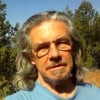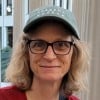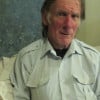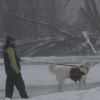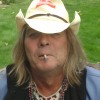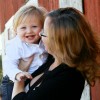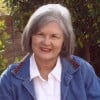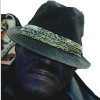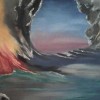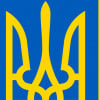Why are people so concerned about their heritage/ancestry?
Why are people so concerned about their heritage/ancestry?
I am not asking this question to be mean. I am just curious. Personally, I know that my ancestors came from Germany. I am satisfied with knowing that. I don't need to know specifics of 100 or 200 years ago. That part of my ancestry doesn't effect my present life as it doesn't effect anyone's lives unless they let it. Some people have a tendency to blame what is happening to them now on what happened 100 or 200 years ago. I am just curious why.Nowadays it is so easy to find out where you come from, why not do it.
I agree with you too. It's there so why not. But it shouldn't effect the way we live today.
No, it should affect the way we live today. But, why not...it is kind of fun.
How can you even imagine that our history doesn't effect us? Just as we are who we are today because of yesterday and last week, month, year, etc., so where we came from, in every sense, has long reaching effects.
Greg, please believe me, it not only should affect our lives in numerous ways, it clearly does. This is part of the reason it is so important that we take an interest in our family history. Bloodline is a vital aspect to so much of who we R, Greg.
Actually Greg knowing might actually help to improve your/our way of life, and add understanding to many things. Like for instance my son has a rare blood type and his cousin need a transfusion and she also had that same type and he saved her life.
It's just like anything else that's a personal interest/hobby. It's sort of like asking why people are interested in history in general. I'm not sure there needs to be any "why" other than simply "I find it interesting."
People are different, naturally we all care about different things.What happened to our ancestors absolutely affects our lives. Traumas are passed down to the following generations in the same way wealth often is.
Just look at how many persons these days are taking anti-depressants or anxiety medication. I'm one of those persons.
Even a hundred years ago some of us in the Western world had to forever worry would there be enough to eat. Would it rain so the crops could grow. So forth and so on. We don't have that problem so much now - but we inherited the anxiety just the same. It's epigenetics.There's actually a ton of research that suggests it does work like that especially when it comes to stress. Like the OP said, it's epigenetics.
The Assassins creed video game series is basically an expose on epigenetics.
Our ancestry often does affect our lives, because as much as we like to think that there is equal opportunity for all, the fact is that social mobility is a slow process. Children are likely to be of a similar social and economic status as their parents and grandparents, whether we know it or not.
Most people have little knowledge or use for any history, and so cultures are doomed to repeat the mistakes of their ancestors for lack of their hard learned knowledge that was allowed to be lost again.
Tessa, most Americans consider themselves African Americans, German Americans, Italian Americans, etc. My ancestors being from Germany, I consider myself American German. I will always be American first.
That's funny because my neighbor is from South Africa and he is having a family tree done and researching his ancestors.
A lot of folks just go blissfully by knowing their history and heritage and ancestry. Most folks just take it for granted. Well I was born in a place and space in time where being a bastard son and illegitimate was pretty much a social curse. And in a pretty small town where most knew most other's business. My dad was a health official muckity muck. Upon my birth he arranged for any details of my biological ancestry was erased from records. So that when I was adopted by him, no one could say that I was born as a bastard and illegitimate.
Fo 58 years that was fine by me. But it was not fine to my 33 year old daughter. So now we know. It is curiously interesting. Now we know. Yawn and sigh for 1 minute and move on.
I think the folks that do this really do a great job of advertising. Like that really shiny cool car commercial. They just really convince us that we need it and everyone else who is cool has one. Pet rocks and Beanie Babies and the latest phone gizmo - Pokeman?It's important to many of us, especially since various TV programmes have featured personalities from either side of the Pond in "Who Do You Think You Are", where some surprises have arisen - some less savoury than others - in their family history.
My own family has its origins - going back three or four generations - in the North and West Ridings of Yorkshire, East Anglia, East Sussex and across the Continent to the eastern Alps either side of the border between Slovenia-Austria, and Austria-Hungary. Beyond that to the North-west of England near Lancaster (as the name suggests); then on the other side Upper Austria, Moravia and Upper Saxony - so I'm told.
The meeting point between west and east slots into the end of WWII. Before then my Dad (and his immediate family) had never left Yorkshire in his early years. His grandfather (mother's side) ran away from home at St Leonards near Hastings to join the cavalry and then settled down to a warehouse job in Leeds.
My wife is a Cockney, some of whose forebears come from Wales, although their origins are mostly from Bethnal Green and Bow on the east side of London. My two younger offspring were born in Newham, the eldest in Waltham Forest - within a five mile radius of one another on the east side of London. My younger daughter is keen on an Italian in Vienna, where she's doing her PhD in Physics, her sister lives with a Spaniard across the river from us in North Greenwich, my son studies and lives in Dortmund where he lives with his local-born girlfriend.
How will that end?In the U.S. so many names were Angelicized for convenience of spelling upon entering the U.S. I have a line of Penrods that I thought were English but were German Jews, Ben Racht, or something like that. Research gives us true origins.
The town of Lancaster was entered in Domesday as Loncastre, the burh on the river Lune. The Northumbrian and Mercian Angles knew it as Luneceaster. Versions are Lankester and Lanchester (there is a Lanchester across the Pennines in County Durham).
The interest is stirred up by current TV series, but my mother and grandmother lived and breathed genealogy long before these. They went to courthouses and cemeteries and wrote to distant relatives seeking the links to the family history.
I find your information very interesting, Alan. I guess that's real American of me? LOL A Y-DNA test on my brother revealed that our Scottish progenitor, Johnston, was genetically a Welsh Clendenin. Isn't genealogy fun?
And some people hardly go anywhere, even today. My mother has never lived anywhere more than three miles from the house she was born in, more than 101 years ago!
- Cissy1946posted 9 years ago
0
I think that so many people are interested in their heritage/ancestry because America is such a mish-mash of people. When people first emigrated to this country they usually lived in communities made up of people from their own country or who spoke their language. As they assimilated into their new country they, and especially their children, began to spread out to different areas. As they became more and more the product of the American society rather than their parents or grandparents society the sense of belonging that comes from a close knit community is lost. So you have people of all sorts of coloring combinations (not just skin but eyes and hair), teeth size, bone structure, and so on but who have no sense of belonging anywhere. So they start looking for background information that will give them that place to belong. Sadly, they don't realize that the place they belong is right here with the rest of us who have parents, grandparents, and great-grandparents from all over the world. Just like the places their ancestors came from we are also a community--just a newer one and a much much larger one.
I think there is a longing for many people to know where they came from in part for the reasons you list. Little children start asking that question, and that question sometimes expands as people mature.
There's the link between your Anglicised name and Greg's for a start. A 'Schweizer' or 'schweitzer' (as with the missionary Albert Schweitzer) is someone who herds or droves cattle.
Alan, maybe that explains why I have always had the urge to be a cowboy.
Names are a whole different world from heritage and ancestors. Following names will only lead you down a rabbit hole you may never get out of. Names were changed at the whim of whoever was filling out a form and how bad his spelling was...
The people I know who are interested in knowing their ancestry is because they are just curious.
Personally, I am not. I have no time for looking into my ancestry.
But yours is a great question and deserves a response from a diversified group of folks here on hubpages.
Regards,
Suhail and my dog- RTalloniposted 9 years ago
0
"Who are we?" is a question that's, in one sense, sort of unique to America's general population considering the facts surrounding how and why we were founded. Such a young country we are!

Your question, though, gives me the opportunity to consider something I like to ponder. In the human heart and mind there is something that calls us to more. I think little children know it, and that it spurs them to bigger and better things as they grow. But sadly, too many lose the sense of it unless they are taught that they were truly created for great things no matter their abilities, circumstances, or opportunities.
All this sort of pondering the topic comes from the fact that God tells us that we were each one created with purpose, and that is to glorify Him. Embracing that concept according to His word is the beginning of a journey that culminates in joy far more than we can now comprehend.
"Who are we?" seems to be a question that reaches throughout time and place, evidenced in historical writings poetic, philosophical, and scientific. My husband and I were just this morning talking about the differences in people who never ask themselves "Isn't there more to life?" and those who do.
I was reminded of where God speaks as He did in passages like Deuteronomy 5:29, 32:29, Psalm 81:13-16, Isaiah 48:18, Matthew 6:33, and Luke 19:41-42. Who we were created to be is one in the Christ: Galatians 3:28, and I'm thankful to know that where I am going is more important than where I come from.I guess I asked my question wrong. I was thinking about the way past effecting lives. People hold it against for being Jewish. People complain if someone flies the rebel flag. Slavery is the blame for the situation of the blacks today. The question
What you mention here in this comment Greg, is far removed from the basic premise of the topic of heritage/ancestry study. Two different branches of the same tree, but different nonetheless.
Paula is right! And My husband is as interested in his ancestors as I am in mine, His Ancestors are from Poland, Lithuania, Yugoslavia and we know that at least one of his great, great uncles was a Cossack. I know almost as much about his ancestors.
Shyron..UR smart to take an interest in UR bloodlines/ancestry. Both U & John can glean info vital to many aspects of UR life.Genealogy was a major course of my degree in Behavioral Science. It can be invaluable as well as quite fascinating.
I disagree about only in America people are interested in ancestry....My mom's side of the family live in America, but I got more help with my family tree from my family up in Canada....They cared more about it than the Americans in my experience....
I love your answer R Talloni. It is a lot like my answer referring to the collective unconscious, which is totally fascinating. And Greg, look up "Race". Races amoung humans has been disproved longago
History plays a part in our subconscious if not conscious thinking. The way African American people are thought of & treated today is a direct result of how most of them came here in the first place, and because of the way they were subjugated for decades.
Certain ideas & beliefs and values are handed down through the generations & where they came from is often unknown. Searching one’s genealogy can sometimes provide answers. Sometimes there were good reasons for certain beliefs & actions and sometimes there weren’t. Sometimes certain beliefs & actions outlive their necessity if there ever was one. Check out my hub titled How and Why We Form the Habits We Have.
The beliefs & ideas of our ancestors lives on in us today. The deeds of our ancestors made a difference in our own lives & often many people’s lives.
My ancestors were here before the Mayflower arrived. More arrived on the Mayflower. Captain Robert Clark is an ancestor. William Clark of the Louis & Clark expeditions is an ancestor. Several ancestors on both my father’s & my mother’s side fought in the Revolutionary War as well as the Civil War. One of my ancestors was a guard for Lincoln. All these people made a difference in my life & in yours. Had things not gone as they did, we would all be living different lives today.
Most of us hold attitudes & beliefs based on similar if not same attitudes & beliefs our great great great grandparents and beyond held. While technology has changed, people haven’t changed all that much in their attitudes & beliefs over the centuries.
How people think & arrive at conclusions and beliefs they hold is genetic. The thoughts themselves are not genetic, but the process of thinking is. There is more than one process of thinking. Some people are more prone to negativity in one form or another, or many forms. That is also genetic. No doubt their environments validated that negativity over time, but it didn’t originate it. The origin is genetic. Any predisposition is genetic.
People who do not know their history are doomed to repeat it, historically & personally. Progress cannot be made if one must reinvent the wheel every other year, or every other generation.
We are all products of our ancestry, not just our experiences & upbringing. There is history in the way your parents brought you up & how you in turn brought your own children up. With a bit of research you may discover how many things you have in common with people many generations back.The way we are is shaped by what has happened to us in our own lifetimes, decisions we make are a product of that environment. People two hundred or more years ago would not have understood our circumstances, nor the other way round.
Alan, I believe that is the first answer that I have gotten that really understood my question, thank you.
Greg, I don't understand your answer to Alan. Your question was phrased as to why people were concerned, not a professional psychological explanation. As a legal editor, your answer wouldn't hold up in court. LOL
Miz, did you read the explanation of my question below the question?
Yes, I did, and your explanation pertained to you, fine, but your question was simplistic as stated and didn't address social problems like your own explanation did. Mr. B says "fu** what I said, you know what I mean." I guess that's a man thing.
Miz I am sorry if I offended you somehow. But in my explanation I said that I was wanting to know why 100 to 200 years ago effect our lives today. I am sorry if I didn't explain it well enough.
You didn't offend me, Greg. I was just explaining how Mr. B explains a "man thing." Sometimes when people ask a question, the explanation doesn't coordinate with it, and we don't know which to answer.
I have found the readings of my ancestors fascinating. DNA findings will continue to bring us heritage, belong and, maybe, just maybe...community once more.
We know longer live in an age of community...we do NOT know who we are unless we go back and see...so, for me, the study of my family and its history is fascinating.
With a name like Zacharias, from the biblical record I have a good deal to discover...from meeting folks from around the world with the same surname, I find the research, not that it is comprehensive interesting to say the least.
To know the past is to plot a future for the family traditions that have already been laid to rest. One should never overlook an opportunity to find out whom one is...imho...it is much better than filling time with television, or, dog forsake, gaming, lol
I know what my family name means, I know where we came from...I like to think I know myself better everyday--for we and our families are often the greatest mysteries to solve...or resolve...sure beats anti-depressants and self-medication...do some historification...you might find it revealing. Smiles from Canada. Thanks, Schweizer...good topic.Name origins usually give a clue as to where someone or their forebears came from. Even within a 'small plot of land' such as England there's diversity that links to Scandinavia, NW Europe and Anglicised versions of Gallic or Gaelic names.
Hi Greg Schweizer of Corona, California! How's it going?
The crux of the question your asking seems to be: "Some people have a tendency to blame what is happening to them now on what happened 100 or 200 years ago. I am just curious why."
Tell me: Who are these "people"? How do they frame the connection between their present suffering and "what happened 100 or 200 years ago"?
For what its worth, I might be able to address your curiosity more efficiently with some specifics to work with.Most people who say this mean the black people. That whole slavery thing. Why they are not over it.
Native Americans, too. What's left of them. I say them because those of us with Native American blood are diluted and the govt. doesn't recognize us, but if we contained that mix of biracial B&W, we would be classified as black not white.
I understand what you are saying. I equate knowing about heritage/ancestry with any other life style. For myself I like knowing about my heritage/ancestry because my relatives were a nomadic group. I enjoy know about other people who have some of the same background. One of the things I have found out is who brought a disease to my bloodline. This knowledge will not change my having the disease. However, knowing does give me more information to pass on to my immediate family (children). I feel this is a part of my parenting.
Greg.... It's not that people are "concerned about their ancestry," as much as they are curious & interested in having answers to questions they may have or explanations for numerous aspects of their personality, belief system and talents.
I have to tell you Greg, ALL of us, our heritage/ancestry most certainly does effect who we are today, how we think, work, play, love and live. We are in fact so connected to our distant past, it is often imperative for people to know from whence and from whom we came.
Also Greg, I'm afraid it is not a matter of "blaming" our current situations on events of the distant past. Blame does not even enter into it. It is a crucial matter of understanding and having the opportunity to research one's bloodline in depth. Do you realize that today's scientists, biologists and genealogists are discovering actual cures for catastrophic diseases through stem cell research and DNA study? Identifying the genesis of a chromosomal defect from a century ago can result in discovery of the means to eradicate such a defect! Is this fabulous enough information for you to grasp the importance and vitality of learning one's heritage and ancestry?
Please take note of the comment from Wesman. He is 100% correct. In the study of Human Behavior or the Science of Behavior analysis, one's brain waves and neurological function can be traced back several generations in terms of familiarity.....Our very mental health can rely on the mental health of our ancestors....or of course, the opposite of healthy, unfortunately. But to know can make all the difference in the world.
If it satisfies you to simply know that you're ancestors came from Germany, this is fine Greg. There's no law that forces us to dig further or deeper. You may want to know though, that many many people who were led to believe certain alleged facts about their family history have come to discover through DNA testing and genealogy tracing that they were not at all what they had believed. This has been occurring for thousands of families. You can read true life stories on line any time you like.If I'm not mistaken, our own MizB here at HP wrote a hub about her ancestry search that was quite fascinating!
Should you ever have a change of heart about knowing more of your heritage, I think you would find it very interesting and enlightening!.
Great question Greg,Thank you, Paula. One thing I'd like to add is that if my mother had known that she had Jewish blood, she would have known that she had celiac disease instead of fighting wheat all her life. I have it, too. Ancestry research could save one's life.
Hi MzB! I'm glad to see I remembered correctly. That proves to me that I really liked your hub & it made an impression on me. Topics of interest! See, Greg?
"You are not a unique entity. You are the last sentence at the end of a long book."
Ancestry thus gives you the prior story.I think I understand Greg's question fairly well. One of my reasons has been my love of history that caused me to question the motives of my various ancestors who came to American. For instance, why were my French ancestors Protestant and not Catholic, and why was my progenitor running from something in France. He was a wealthy either nobleman or royal, not sure which, Hugenot. My German ancestors were barons, so why did they come here about the same time? Probably again, religion. The Scots-Irish seemed to have the same motive. Why did several of my European ancestors marry Native American women? Don't know that one. I think It was satisfying to know that my ancestors who came here were not murderers and thieves, but sometimes religious zealotry can be just as bad. I have diet restrictions because of Jewish and Native American ancestors. So Greg, if you are a healthy man, carry on. But if you start getting ill, I suggest you delve into your ancestry.
Tessa, I'm not sure I understand your answer the way it is phrased. Can you rephrase, please? "We don't care less" trips me up.
Maybe your neighbors know that you couldn't care less about you ancestors and they just don't talk to you about genealogy.
True, my mother's family was like that. They wouldn't talk about where they came from because "it wasn't important." Maybe mom could have controlled her celiac and not gotten colon cancer if it had been important to them.
Maybe they wouldn't talk about it because they weren't sure how the story 'fitted together'. Often the further back you go your forebears didn't understand the reasoning. Many Huguenots came to London to flee the 'Sun King' and Cardinal Richelieu
Dunno, Alan. Could be. Her maternal ancestor was dumped in America by his father to avoid the rope because he killed a man in a duel. Then daddy sailed back home to Versailles. I love my interesting ancestors.
To be honest I am not sure why people need to know their ancestry so far back. My mom told me once that her grandma came from Germany however I have no proof and I really don't care. I am who I am and my ancestry has nothing to do with it. I tried to take German language once and learned I can't grasp it but French was much easier for me.
I think it's exciting to learn about history and see where we came from but that doesn't define us. We are who we chose to be, we rise up and be better than those before us that's the point of moving forward. If you want to identify with you history then do so with grace. It is just disrespectful to your ancestors to be anything less.
But like I said, it's the past, it doesn't define you at all, and you shouldn't let it. Times have and are changing we need to follow the curve, not live in the past.Allisha, finally, I am getting answers from people that actually understand my question. Thank you, Greg.
A search into name origins renders mixed results, different across European countries. One of my forebears may have been taken in as a ward of the borough/workhouse when parents died or gave up offspring, unable to cope. Lancaster' is a case in point
Our ancestors determine who we are to a certain degree
As I have said before we are who we are because of who they were
They determine what color our skin, hair and eyes will be
And what diseases we could possible get, at least genetically
I am not afraid to look up my family tree
I am not afraid of what I might see
I just know that they all contributed to the parts put together to make me
My great, great grandmother was in the "Trail of Tears."
And that held my interest when I was learning about those years
This does not make me better it does not make me worst
But if I see in me a quality or a quirk
I can say, this is the heritage from the ancestors of my birthI was adopted so it's interesting to me... and as others have said, it can give you valuable info.
I battled a rare auto-immune disease for years and they couldn't figure out what was wrong with me. They went through everything, including giving me a good cancer scare. I got so bad I was in a wheelchair and had to have exploratory surgery.
Turns out the disease I have is largely genetic, from a certain parts of the world, and people with those genes who live in the Southern US are more likely to develop the disease... I moved to the Southern US 15 years ago. I didn't know I had the genetic predisposition to this disease though.On some islands around the UK families were inter-bred. The Outer Hebrides were a case in point, with small communities cleared in the early 20th Century for health reasons. Diet and accommodation also had a lot to do with the problems they faced.
Wiccan Sage, I would be very interested in knowing that disease because I have lived in the south my whole life, except for trying the pacific NW once and the East Coast once. YECH. I wonder if that disease makes me like it here. Also very good pt.
I would like to know the name, too. I just lost my son (August 15) to an autoimmune disorder called Henoch Schonlein purpura. Also celiac runs in my family and it comes from the Middle East. Curious as to why southerners would have predisposition.
I think it is very natural to think about one's history and heritage and I save some letters and clippings and documents for our daughters. We had an elderly doctor for a neighbor that we used to invite to dinner and one evening the subject of heritage and the current interest in tracing family on sites like Ancestry.com. He chuckled and said, "Do you honestly believe that in all that time no one ever "jumped the blanket?" So true!
That's why the DNA test is opening up new avenues for people interested in their heritage. We no longer are dependent on old records like marriage licenses and can find some old secrets.
All DNA tests will tell you is if you're connected physically. Written records - i.e. parish & registrars' records, census, family bibles and documents, military or merchant navy records and ship manifests - will tell a story behind a name.
Interesting Question. I think people tend to be patriotic towards the country of their birth but it is also a human condition to want to understand , explore and connect with ones ancestral roots. Today multiculturalism and globalism promotes a global culture but people still tend to stereotype minorities.
I got my results and I was amazed. It left out the fact that I am American. But I know that is in my ancestry. And it put in UK. Which I know has ancestry from Gaul, Roman and Nordic. So it left out the distant and left out the closest. ????
For my part, the answer is pretty simple.
You at least know that your ancestors were from Germany, I simply know that mines were from Africa, where in Africa?... I don't know, do I still have family down there? What did my great grand parents looked like, what did they do in life ect...
I guess you can see that it is mostly due to curiosity and also to know my family better, maybe get in touch with some of them.
When you know where you come from it is easy to not see the importance of that, but when you are in the shoes of someone like me, you can see how important it is. I believe that knowing forges our character and makes us value ourself more. Imagine you were the descendant of aristocrats, yes you would not have any castle and what not, but knowing this information might give you more self esteem or something. Basically it makes us feel good and learn about ourself and wish I kbew where exactly I came from
Louisiana, I hope that you find your ancestors someday. It is very rewarding to learn about them and what they were, do you have cousins in Africa? I wish you luck in finding them. Blessings
@Shyron I don't know if I do. I am Afro Caribbean, I suppose my heritage comes from there, I do know that I have Latin American family and European family and as I am black too I guessed African too. I searched but these documents are hard to find
- marcuscaineposted 9 years ago
0
I think it has to do with people wanting to learn more about their identities.
I have researched my family tree due to not knowing any of my mother's relatives or ancestors. It makes some people want to know why he or she might look a lot different than their parents. And then there is the folklore of the family about indian blood or whatever. So people sometimes get curious. It's sort of like trying to understand yourself through genetics. And I think it is mean for people to blame something that happened generations ago. Everyone makes mistakes
Hello Greg,
Knowing our ancestry can help us to understand where we came from and how we got here. It can help to explain why we react the way we do toward others and why we react the way we do in certain situations. It can help us to pinpoint our strengths and give us the knowledge to understand and work on our weaknesses.
Knowing our heritage/ancestry is a great way to obtain essential tools that can help us to plot out happier and more fulfilling lives for our posterity and ourselves.I think that people are concerned with ancestry/heritage because it gives them a cultural definition of who they are. We are, as a human race, prone to grouping and classifying things as one thing or another so cultural heritage is just another way of finding the niche in which you belong. Culture or ethnic heritage gives you a sort of map from which you can guide your behaviours, and gives you a sense of normalcy in how you do things, If we weren't concerned about heritage or ancestry then cultural conflicts would cease to exist and while this might be a good thing, it would also leave us with a bunch of people that are all exactly alike in their ways of doing things. This would take away the rich diversity that comes from many cultures.
I think there can be legitimate claims by certain peoples that what happened a hundred years ago does in fact affect them today. For example let's talk about African Americans. They can claim there have been no significant inheritance from their ancestors because it was stolen or otherwise prevented from them. As a white American with no inheritance I am still better off than African American's in general because a certain percentage of my fellow white American's did receive their inheritance and were able to produce an economy where I have benefited directly.
On the other hand your family lost out in the Highland Clearances, but won in the long run by emigrating to the US and Canada... having been blighted by clan chiefs who preferred sheep to crofters. Things weren't much better south of the border.
You may not believe this but the Mormon prophet Joseph Smith actually prophesied in writing over 150 years ago that this current quest for genealogy research would take place! This prophecy is specific enough to warrant great credibility.
It so happens that the modern day Mormons have the most expansive and interconnected genealogy files on the earth today. They do this in oder to symbolically baptised every person they can using secret ceremonies.
As I study the various religions I am able to discover such things out and share them.Often it is in the last 10 or 20 years of a life that people develop a passion for genealogy and tracing their ancestry. Keeping the family stories going and passing it down to the next generation gives essential information to our survival and occurs across many cultures and even among animals.
We pass along the life skills and values in these stories or in the case of the animals, where is the best watering hole and what foods are safe to eat. There are studies going on relating to inherited memories and they think that deep within our DNA, we pass along the effects of such traumas as the holocaust or the Irish potato famine.
Fascinating to me, but not as an excuse for my current behavior. It's a way to celebrate the parts that make me unique. I support separation of church and state (not just because my Pilgrim ancestors escaped religious persecution in England). I love Celtic music and that may be a DNA thing. The first time I heard an Irish folk song, I knew that was what music was supposed to sound like.
Does it make a difference in my life that my maternal grandmother took in laundry back in 1900 to support her children after her husband died? I celebrate that I came from a long line of sturdy, pioneer women and men. My great-great grandfather survived the starvation of Andersonville prison in the Civil War and lived to be 94.
I'm sorry that you are missing out on the stories of your ancestors.People are concerned about their heritage/ ancestry because they are not happy with their current situation and want to find out if their ancestors were better off than they currently are. If their ancestors were better off than them, they can tell everyone in earshot that they came from a prominent lineage, and thus feel good about themselves.
That is probably true of more people than would like to admit it.
On "Who Do You Think You Are' recently Alexander Armstrong and Matthew Pinsent tracked their line to the 11th Century, to William I. It's a feat of documentation, arms and all. Alex. Armstrong also has links to the Reivers (Border country raiders)
I think every single person, if they want to take the time/money will find at least three famous/infamous people in their lineage. Mariah Carey? Maybe not. Someone rightfully famous. Learn History
It makes us who we are and gives us a sense of belonging. It only bothers me when Native American tribes complain about their kids being put in foster care with non native people. They complain that their kids are being deprived of their heritage yet they never act on it and claim their children.
If you are talking about child protective services and foster care, etc, I mean FOSTER CARE, not day care, and YOU care about your kids, (yeah, kids are taken for the WRONG reasons, You cannot just claim your kids. They are State Property. PROPERTY
Some people are just interested in history and culture. For me, taking a DNA test and researching my family tree was about learning about history, which I also studied in college. Of course I am not my ancestors, but it is interesting to learn about how they traveled to different places. Also, I feel my family tree project is something I can one day share with my niece and nephew, if they are interested in looking at it. I have met a couple of third cousins and learned more about one side of my family I never would have if it had not been for taking the DNA test and working on the genealogy. So I think this is kind of cool.
Met a great aunt by accident when looking in a graveyard (West Rounton nr Northallerton) for my great grandmother. By her request there was no stone. I got to know my great aunt and her husband well. Visited a few times, once with the wife and kids
Personally, I wanted to learn about my history because, the past that I actually took part of; some of it was lost to me. I suppressed a lot of things and time in my life and when I begin to get that information back; I got more questions then answer's.
As soon as I got the courage to speak with my Mother, she passed away. A few months ago, I begin the a journey to find out answers, to my direct history and again, more questions- so it begin as a journey. Before I went out on my road-trips, or even when I went back to my Mother's friends, pre-Me; everyone said people may not want to tell me the truth but, I got the truth from everywhere. No one was afraid to tell me truths that may hurt, truths that some didn't know.
I made it all the way to my Father; he left me when I was three and sure I knew him, I even spent a year with him but, with all that said, he has never said Happy Birthday to me. I didn't even know his birthday, until a few months ago. I traveled six hours to see him and reconnect and after four days; he couldn't see me. The mystery of him, almost destroyed me and before I left a complete stranger gave me the words I needed to heal; from the "lost" of my Father. He asked what would be the one thing I wanted to know and I said why did he choose to leave or why did this gentlemen choose to stay and love his children; he said "Crystal, I didn't think I had a choice..."
When I begin the journey, these people didn't just give me past information, for my Grandmother, Great Grandmother, Mother and oldest Brother; I lost all four of them from 2011-2014. They gave information about years and years ago. Mine begin as a local (immediate family) search and turned into a historical mystery. On my journey I found out, we were celebrating my Great Grandmothers birthday a year late and six months off; and that her Father was 45 years older than her Mother, when she was born. There is no actual record of my Great Grand Father but, I believe he exist.I'll answer this from my one person experience. I've been researching my family tree for over 25 years. For me, it's a love of history and a curiosity in finding out who my ancestors were and what made them tick.
It'd difficult to put into words. But, when you read about a historical event and then you learn your ancestors were a apart of it, the history comes alive and becomes more personal. You learn to embrace it all, the good, the bad, and the in between. It becomes a part of you in a small way, as well.
Those who aren't interested might think it is just names, dates, and places. However, when you start digging, their stories come to life. You try to understand what it must have been like during their times.
As you uncover stories, you get beyond who, where, and when, to why and how. I've found it incredibly humbling to find my ancestors stories, to know what they struggled through and triumphed over. I cannot really know what it was like for my ancestor in the 1850s who lived in a small village in the Azores watching all but two of her children die, but I can wonder. And, whatever disease it was may explain why the next generation was so eager to leave to work sugar plantations in Hawaii or cotton mills in Massachusetts.
I will admit like many others it's part addiction, too. You really get hooked on the research and on uncovering the mysteries. It's like being a detective only your relatives are the lead characters.
There is something moving and personal about family history. You get a sense of being connected to all these people who had to come together so you'd be born. It's becoming even more interesting for me as I've made connections with people in France, Canada, and the Azores who are working on the same family tree but from different ends.
While you say that part of your history 100 or 200 years ago doesn't affect you today, it's still a part of who you are whether you acknowledge it or not. I would not be here writing at this desk if it wasn't for 17 immigrants who left their countries between 1845 and 1907.I agree 100% And I think there is a reason we are pulled into the stories of our ancestors. Historically, People stayed very close to ancestral homes
Perhaps part of it is that many people feel disconnected to others. We spend more and more time on the computer and not interacting socially except through social media. I know I can go literally weeks without even seeing another person. I work from home, so I don't leave my home much. Knowing your ancestry gives a powerful opportunity to feel connected to something bigger than yourself.
Another answer is novelty and marketing. Though this same DNA testing isn't anything new, the companies behind it have really revved up their marketing efforts. So, many people learned about it only recently through the often emotional DNA ancestry marketing videos.
I've watched some videos of people opening their results, and I haven't seen anyone react in a way that you describe, blaming their heritage for their circumstances. I do like to see people's reactions though. I was so confused by this one African American woman who opened hers and was surprised to find that she wasn't Native American. I remember she said, "Like all black people, I thought I was Native American." I can't even wrap my mind around that one! LOLCouldn't agree more. People dwell on the past a lot often as a coverup for their own failures.
Personally who my ancestors were dosn't make much of a difference to me, but the society I live in which is so damn stratified and casteist, sometimes the criticism almost hits you like a bullet. I mean, comeon you can't blame me for what what my ancestors did 100-200 years ago.
Be the change you want to bring in the society as simple as thatFor many communities around the world, this question is important in political terms. Just look at the Jewish people with their belief that they have a right to live in Palestine - and nobody else does - because their remote ancestors did. This claim is subject to considerable debate, however, and should not be accepted at face value. The line of biological descent from ancient to modern Jews is a lot more tenuous than most people imagine.
The same goes for people such as the Native Americans - although their ancestry is less debatable, in they they can point to much more recent history to show how badly they were treated by the incomers from abroad.
These cases leave aside the question of whether the residence of an ancestor in a certain place confers the right of residence in that place on descendants many generations down the line - this is a very thorny question indeed!Their are some people that just accept, and then their are others,(like myself) who actually enjoy learning...do you speak other languages? Have you traveled? How curious are you of other cultures? How sociable are you? Are you ambitious? Shy? Outgoing? These are questions that will determine your curiosity for life in general, which involves ancestry.
When u are unable to justify urself about such curiosities, u should leave everything upon our creator.. But we becuse of our ungratefull nature, always want to blame others( society, ancestors, environment)
I think it's basically important to know where you came from. It can help you decide who you are and what you should do with your life. It can also give people a sense of purpose, belonging, and identity. These are important to some people more than to others. I think in America we're more about who we are as individuals, but in some other cultures it's all about heritage as a way of talking about who your "tribe" is.
I would like to bring up what Jung called, and other scientists still call "The Collective Unconscious." In the following article, https://www.wisconsinmedicalsociety.org … -software/ he calls it genetic memory. And in his study he sites case after case of PEOPLE KNOWING WHAT THEY CANNOT KNOW. Often this is seen in autism and brain damage victims. and so many of these people have "splinter" skills, such as calendar memory, or talent skills, such as KNOWING THE RULES for music or art to the degree that if they were not neurologically damaged they would be considered geniuses. He contends, as do many, many others, that these people simply have gained access to the genetic memory that we all have, from the RNA of our own ancestors. I personally do not know why an autistic person or a brain damaged person cannot claim the title of genius instead of Savant. But absent brain damage, those who show prodigious unlearned skills are labeled prodigy and then genius. In other words, the mind of the infant is not a blank slate, but is equipped with the "rules" from genetic memory.
Another article pinpoints the site of these same genetic memories, on worms, however. If a worm needs genetic memory, how much more so a human! In the following article http://futurism.com/memories-can-inheri … t-figured/ the author cites hard core details of the role of a worm's RNA in "remembering" it's parents physical hardships, such as near starvation, viruses, maybe being stepped on. And, they have also identified the action in the worms that can "turn off" these RNA memories. So now we are not just talking about passing down our DNA to our children, and our grandchildren, and on and on and on, we are talking about RNA memories that can be shut off or amplified in times of stress, but remain coded in our inheritance for perhaps thousands of years. In the "old days" people married for "breeding" even after they may have lost fortunes (before insurance) via fire, flood, revolution , war, Apache attack, or train robbery. A decent bit of my ancestry comes from those Apaches. And just a little comes from the Powhaten tribe, I am one of the few direct descendants of Pocohontas, on the Red Bolling Tree. I have to admit, I feel like I screw things up a lot, but when I think about these ancestors, and others, I feel like I might have the right stuff hidden inside me to make itWhat in the World? I actually learned something amazing from this answer. It even had links! Are these answers in order of Best answers or just most repetitive? Do Hubbers actually read?
I can say from doing my own family research I learned a lot about myself. Has anyone discovered anything shocking? I have discovered family secrets and learned why they were so well guarded. Reasons that make no sense to me. After doing family research many things in the past now make sense. I think it was an important journey for me. It put many things in perspective.
Sometimes life can contain too many unanswered questions that can tug at a person's daily existence. When this happens there is an instinct urge to uncover once heritage. It certainly takes a special type of person to look back in time, to patiently turn pages to uncover an ancestry. It also requires a high level of curiosity to take time out of a present day activities to uncover the past.
It would be nice to learn more about my heritage. It would be great to read about my ancestry. However, with so many unfinished projects, I table such a desire and opt for present day life.For me, it's a fascination . . . I love the stories. I don't feel like it effects me; I simply enjoy the search and discovery. I've met some interesting people, and it's made me appreciate some of my ancestors. I've discovered ancestors who left Europe because of religious persecution and found some who were sent from the country as punishment. Some stories are sad, some are funny. It's much like reading a book but the end of the story is me!
There's the argument that our upbringing is directly because of the upbringing of those who came before us. That being the case, knowing why our ancestors did what they did helps answer questions regarding why we do what we do now.
There's also a new argument brought up by science. Our DNA contains not only physical traits, but some cognitive traits as well. One of the things being studied is how much our DNA actually contains memory. If our DNA contains enough memory that effects emotional state, or behavior, knowing our ancestry may hold even more answers to why we are who we are. This includes our values and motivations.
Pointing blame at centuries old arguments is unhealthy, but understanding old issues can help heal.
Great question by the way.TY. I have read since I asked this question that they now think that, like you said, the DNA may very well carry memory, maybe even skipping 1, 2 or even several generations. They say that might explain child geniuses or gifted talents in children.
Related Discussions
- 35
Is it racist to have a concern about immigration?
by karl 11 years ago
Is it racist to have a concern about immigration?A few of our left wing buddies start shouting about people being a racist when they show a concern about the levels of immigration. Is immigration a question of race or a question of numbers?
- 44
Do I need to be concerned about my 2yo?
by Karen Metz 15 years ago
My son's doctor wants me to send him to speach therapy because he isn't saying many words. I kinda disagree. He is only saying a few words, and once in awhile he will say a new word, but I can't get him to repeat it. His favorite words are up, more, and mom. I am also...
- 64
Who should the church be concerned about?
by Joshua Zerbini 13 years ago
Should the church be more concerned for the unbelievers outside the church or for the believers inside the church? Or should there be a proper balance?
- 8
Wow! If you're concerned about our education system, watch this!!
by Holle Abee 14 years ago
http://www.youtube.com/watch?v=zDZFcDGpL4U
- 13
Why ARE so many religionists CONCERNED about Atheists?
by Grace Marguerite Williams 9 years ago
Why ARE so many religionists CONCERNED about Atheists?
- 11
Should parents keep children out of their bedroom? Why or why not?
by Caitlin Pyle 13 years ago
Should parents keep children out of their bedroom? Why or why not?
